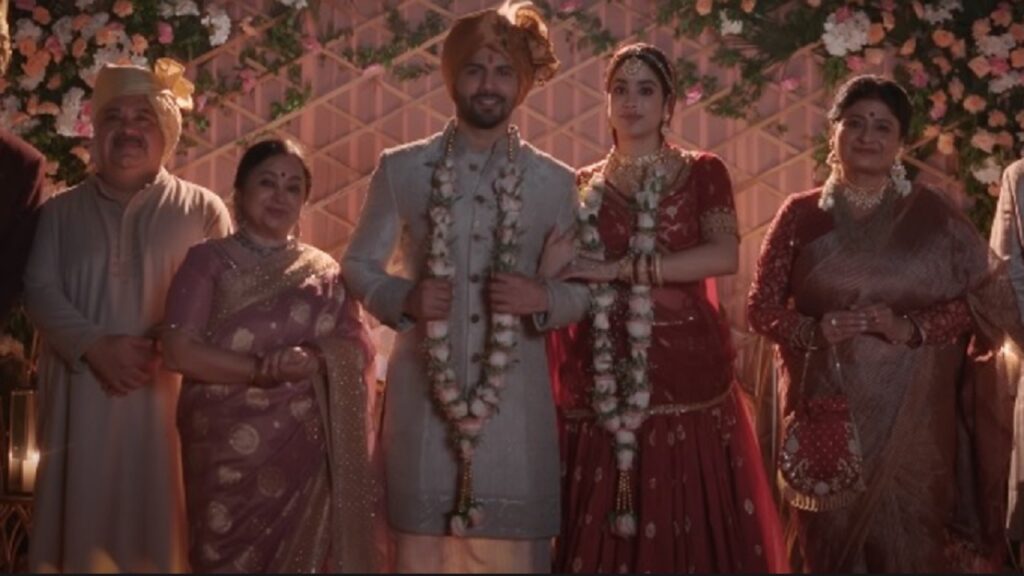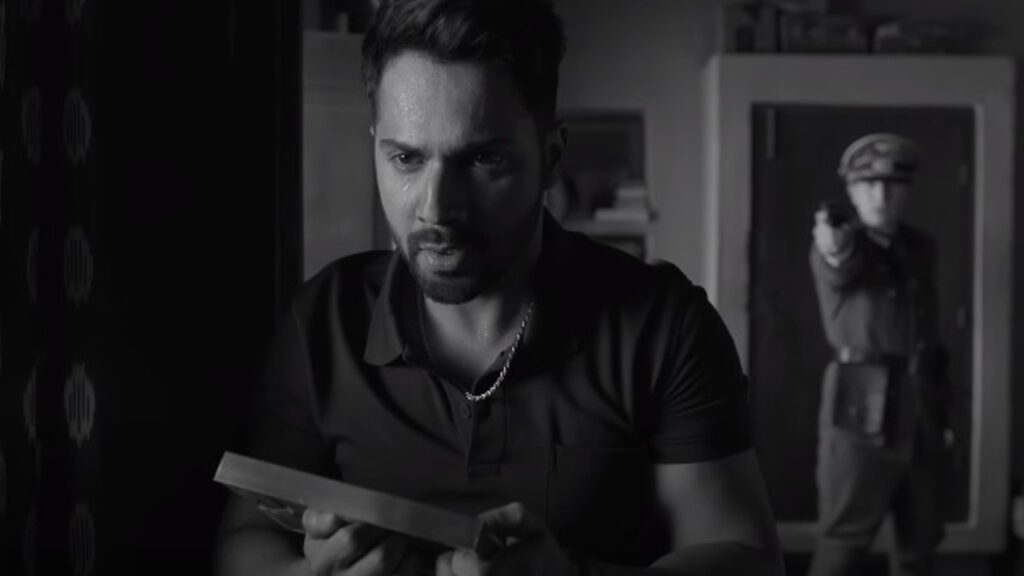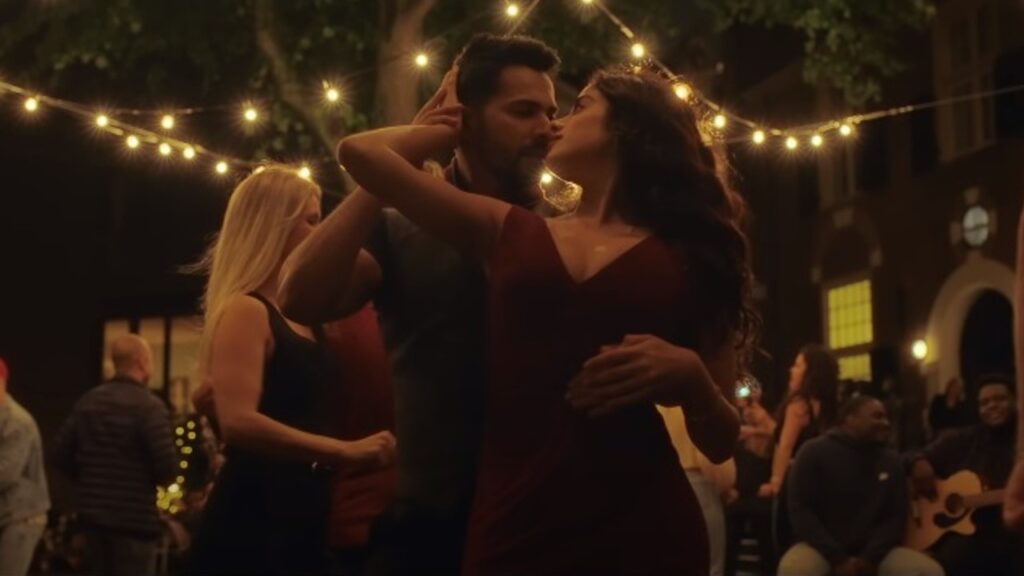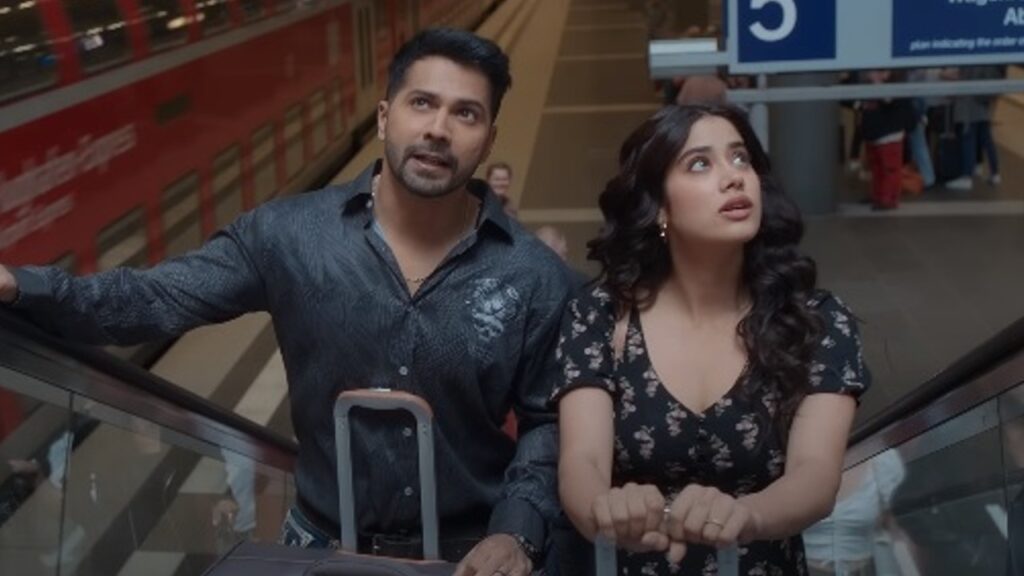Bawaal movie review: This Varun Dhawan-Janhvi Kapoor starrer fights an ‘unusual’ war but finds its real, lasting victory outside the battlefield.
Cast: Varun Dhawan, Janhvi Kapoor, Manoj Pahwa, Mukesh Tiwari, Anjuman Saxena, Hemang Vyas, Prateek Pachori
Director: Nitesh Tiwari
Writers: Piyush Gupta, Shreyas Jain, Nikhil Mehrotra, Nitesh Tiwari, Ashwiny Iyer Tiwary (story)
Throughout the film, Ajay aka Ajju (Varun Dhawan) is heard telling his bestie, “Beta, mahaul aisa banao ki logon ko mahaul yaad rahe, result nahin.” Well, in Bawaal, director Nitesh Tiwari takes his protagonist’s advice a bit too seriously and ends up leaving you with mixed feelings.
What’s Yay: A unique approach to drive home a relevant social message
What’s Nay: Cumbersome execution, less heart-tugging moments

Story
A black-and-white montage of Lucknow’s ‘sadabahar‘ folk to the tunes of MM Keeravani’s ‘Kaise din kate hain‘, Udit Narayan’s ‘Mat Ro Mere Dil‘, Kumar Sanu’s ‘Tumhe Apna Banane Ki Kasam‘ and Shabbir Kumar’s ‘Teri Meherbaniyan‘ sets the stage for a ‘tadakta-bhadakta’ introduction of Bawaal’s hero- Ajju aka Ajay (Varun Dhawan).
A few minutes later, we are told that this ‘masakali‘ of Lucknow with a magnetic personality, is actually a narcissist, image-conscious history teacher who is unhappily married to Nisha (Janhvi Kapoor). Theirs is an arranged marriage where Ajay prefers to keep Nisha out of sight and behaves coldly with her. Reason? He fears his wife who suffers from epilepsy, might end up embarrassing him in public with her ‘fits’ and tarnish his carefully-crafted image.
Every night, Ajay lets down his façade and wallows in self-pity after gulping down a few drinks with his best friend. Until one day, he ends up slapping a politician’s son in his class in a moment of anger and gets suspended from work. In order to rescue his image, Ajay concocts a bizarre plan of live-streaming history lessons from the World War II sites (Paris-Normandy-Amsterdam-Berlin-Auschwitz) for his students. To make his scheme look ‘authentic’, he reluctantly allows Nisha to tag along with him under the pretext of giving their marriage another chance.
Once, the couple lands in Paris, Ajay realizes that there’s more to his docile wife- she’s quick-witted and well-travelled. With a dark chapter from the worst tragedy in world history unfolding at each of their pit-stops, Ajay realizes that ‘every love story has its own war.’
Direction
“Two things greater than all things are, the first is love, and the second war,” said Rudyard Kipling in his famous poem ‘The Ballad Of The King’s Jest’. After all, these two things are the peak of human emotions. In Bawaal, Nitesh Tiwari picks up World War II- one of the greatest human tragedies for two things- to offer the hero a chance of redemption to save his crumbling marriage and give the audience some lessons on greed, ambition and contentment. Does it work? Well, in parts and pieces.
To begin with, it’s clear right from the start that Ajay is a flawed character whose questionable behaviour makes you loathe him at places. He is a pathological liar and full of himself. There are several scenes especially in the first half which builds his character. That’s why later, when Ajay lets down his guard and reveals his compassionate side, the changes feel organic even when some of the setups misfire.
At one point in the film when Nisha asks him why he is so conscious about his image, he reasons it out as his way of not becoming the ‘dhaniya’ of a paneer dish, and you slowly realize the root of his toxic behaviour.
On the other hand, except for a few adjectives like ‘independent’, ‘outgoing’, ‘happy’ and a bit ‘unfortunate’, Nitesh Tiwari and his team of writers barely give us any insight into who Nisha was before she got hitched to Ajay.
Heard of courtship in arranged marriages? Well, there’s no place for it here as the makers straight away dive into the marriage-followed-by-revelation plot device. This is exactly why things look a bit off when Nisha gets optimistic about her loveless marriage early in the film. Why does she want to stay with Ajay? Has she developed feelings towards him? Is she scared that she might not find a partner again because of her medical condition? Why do the makers want us to root for this couple? The writing is foggy here. Tiwari tries to redeem a bit by giving us a cool set of parents; one of them even says, “Divorce koi halva nahi hai” and advises her daughter to walk out of her marriage if she’s unhappy.
Quite early in the film, Nitesh warns us through Ajay that his plan is a bit ‘revolutionary’ and needs to watched with an open mind. Interestingly, he structures his screenplay as three stages of war- cold war (Ajay-Nisha’s unhappy marriage), the war (slapping incident) and the aftermath of war (Ajay’s coming-of-age trip). However, the idea of linking Adolf Hitler’s hate and the tragic repercussions of World War II to a pompous man’s greed and need for constant validation might repulse a few.
Tiwari uses Nazi fury as a metaphor to show Ajay’s inner conflict and journey towards redemption. While the idea sounds ambitious on paper, Nitesh’s execution comes across as clunky at many places especially when he turns his characters into ‘tourists in history.’ Further, dialogues like “Anne Frank ke ghar se nikalne ke baad thodi philosophy toh banti hain” comes across as tone-deaf.
More than in the World War II portions, Bawaal leaves its impact the most when Tiwari allows his simple moments to do all the talking. For example, take the scene where Ajay keeps bickering about his lost bag while Nisha smiles at the sight of Paris from her car window. The imagery is enough to depict their contrasting personalities. Another effective scene features the duo tipsy-dancing post a happy-hour binge. For the first time, a carefree Ajay and Nisha find themselves on the same plane as they unsuccessfully try to match steps with the other dancers, only to find their own rhythm in the end. Is that what happy relationships are made of?
What Bawaal probably needed was more warmth of love!

Performances
Varun Dhawan has most fun when he is playing the cocky Ajay. He leaves you grinning from ear to ear when he professes his love for Govinda or when he turns into a budget travel enthusiast in Europe. At the same time, he effectively portrays the flawed parts of his character with conviction.
Janhvi Kapoor seems to be getting better at her craft with every film. She brings an equal mix of resilience and vulnerability to Nisha. However, it tad weird that both the actors fare better individually but suffer from lack of chemistry in love portions.
The ever-dependable Manoj Pahwa impresses on screen. There isn’t much scope for Mukesh Tiwari in this film. Prateek Pachori as Ajay’s friend does a good job. Hemang Vyas who plays a Gujju backpacker tries to add some laughs in Bawaal and succeeds a few times.
Technical Aspects
Mitesh Mirchandani uses color scheme in an effectual manner to capture the mood of the narrative. Be it the joyful palette of Paris, the dim-lit rooms and the hues of red to showcase the blooming of a relationship or the monochromatic frames depicting pain, destruction and pathos. Charu Sree Roy’s editing scissors are in place.

Music
What’s a film about love and conflict without some soul-stirring music? Unfortunately, Bawaal misses a mark in this department. Barring Arijit Singh’s ‘Tumhe Kitna Pyaar Karte’, none of the tracks linger with you for long.
Verdict
There’s a famous Sun Tzu proverb- ‘In the midst of chaos, there lies an opportunity.’ With Bawaal, while Nitesh Tiwari misses the opportunity of making a great memorable film, he does make us ponder over his thoughts on happiness and contentment in this fast-paced world that we live in.

